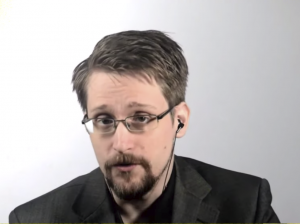Warns against Surrendering Privacy to Fight Covid-19
Since the pandemic began, countries in Asia have put surveillance measures in place that invade the privacy of its citizens in trying to control the spread of Covid-19. According to a story by Stephen Johnson in bigthink.com, Edward Snowden warns against other countries pursuing the same kinds of policies.

Edward Snowden talks about government surveillance and privacy in an online interview with a Danish journalist.
Snowden, as you may recall, was the U.S. government/CIA whistleblower who fled to Russia for sanctuary.
As governments turn to technology to help contain the spread of Covid-19, privacy advocates worry that new bio-surveillance practices might last long after the pandemic ends.
Snowden, a former CIA contractor who exposed NSA surveillance programs, recently spoke to Danish Broadcasting Corporation correspondent Henrik Moltke about government programs being used to fight the coronavirus pandemic. Denmark is considering using phone metadata to track people in response to the spread of the virus.
“When we see emergency measures passed, particularly today, they tend to be sticky,” Snowden said. “The emergency tends to be expanded. Then the authorities become comfortable with some new power. They start to like it.”
Snowden said governments find it difficult to give up invasive programs after emergencies have passed. He is also concerned that using facial recognition software under the premise of helping with the Covid-19 virus will end up taking away even more freedoms, regardless of the country using them.
Giving the government access to biometrics could open up alarming new ways for governments to spy on citizens, Snowden said.
“They already know what you’re looking at on the internet,” he said. “They already know where your phone is moving. Now they know what your heart rate is, what your pulse is. What happens when they start to mix these and apply artificial intelligence to it?
Snowden offered an example: A man in the U.S. watches a YouTube video of a federal official giving a speech. The speech angers him. His pulse and heart-rate shoot up, and this biometric data gets recorded by his smart phone. The government, using algorithms that compare biometrics with online activity and other data, puts this man on a watch-list for people deemed to be potential terrorists or other undesirables.
In China requires citizens to install a smart phone app that assigns them a color code — green, yellow or red — that represents health status. The exact methodology of the app remains unclear. But less ambiguous are the CCTV cameras that the government has installed above the apartment doors of infected citizens, to ensure they stay inside for a 14-day quarantine.
The big question is how far will the Trump Administration be willing to go to “protect” Americans?
read more at bigthink.com







Leave A Comment